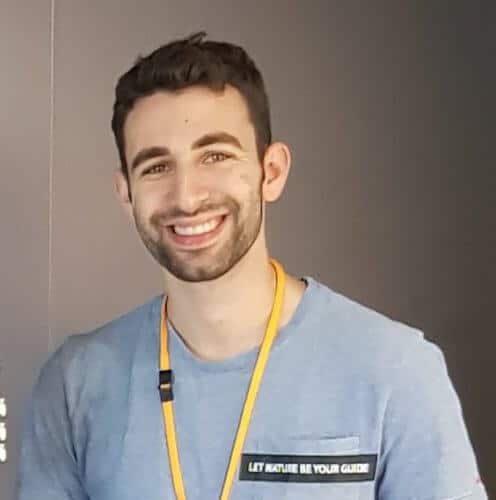Researchers from the Wolfson Faculty of Chemical Engineering at the Technion present the enormous potential inherent in the combination of the two fields in the medical service

Researchers at the Technion present the enormous potential inherent in the combination of artificial intelligence and nanotechnology for the benefit of improving medical diagnoses and treatments. In a review article in the journal Advanced Materials, Prof. Avi Schroeder and doctoral student Omar Adir review the field and present future courses of action.
Prof. Schroeder, head of the Laboratory for Targeted Medicines and Personalized Medicine Technologies, is the president of the Israeli Society for Chemical Engineering and was recently accepted as a member of the Israeli Young Academy - a status given to researchers who have demonstrated excellence in research and original thinking as well as initiative and contribution to society. The research group headed by him focuses on the development of nanotechnological systems to treat medical needs, focusing on cancer.
According to doctoral student Omer Adir, "In the present article we proposed an integrated technological approach aimed at improving the success of the treatment process that cancer patients go through - from the diagnosis of the disease, through identifying the type of disease and adjusting the treatment personally to each patient, to monitoring the recovery process and the patient's quality of life afterwards. Today there are many nanotechnological tools for targeted cancer treatment, and some of them were developed here in the laboratory, but we have no doubt that the integration of artificial intelligence in these tools will improve their medical effectiveness and their personal suitability for each patient. It is worth noting that new technologies such as genomic sequencing generate a huge amount of information, and artificial intelligence methods will make it possible to handle this information well, analyze it efficiently and provide very useful information to the medical team."

Artificial intelligence (AI) and nanotechnology are two different fields that are deeply involved in the development of precision medicine - an approach that allows the adaptation of the best treatment to the specific patient. This adjustment is required because differences in age, gender, physical dimensions, blood type and genomic data create a difference in the effect of each specific treatment on different patients. That is, a certain treatment that benefits one patient may not help another patient and may even harm him. As mentioned, the combination between artificial intelligence and nanotechnology is expected to help better match the diagnosis and treatment for each patient. This combination is still at the beginning of the road, and it requires the integration of advanced engineering tools, but it is already clear today that it carries enormous potential for improving precision medicine.
Today, nanotechnologies are used in diagnosis, and more precisely in mapping the disease profile of the specific patient, and then in tailoring a precise treatment for this patient. One of the problems, in the cancer context, is the great difference between cancer tumors in different patients. Technion researchers estimate that artificial intelligence may help in dealing with the challenge of personalizing cancer treatment.
The research group led by Prof. Schroeder focuses on the development of nanotechnology systems for the treatment of medical needs, while focusing on personalized treatment for cancer. Prof. Schroeder also contributed to the field of agriculture in developing new tools for maintaining animal health and improving food health. He authored dozens of articles, registered about 17 patents and is a co-founder of start-up companies in the fields of biotechnology and pharmaceuticals. He won dozens of awards, including the Krill Foundation Award from the Wolf Foundation, the Intel Award in Nanotechnology and the Yanai Award for Excellence in Academic Education.
Omer Adir completed a bachelor's degree with high honors in biochemical engineering at the Wolfson Faculty of Chemical Engineering at the Technion. Already at the end of the first year of his undergraduate studies, he began to engage in research in the laboratory headed by Prof. Schroeder, and is currently doing his doctorate under his guidance on a direct track. The doctorate was conducted within the Nanosciences and Nanotechnology program at the Technion and is focused on the delivery of drugs using nanoscale particles.
The work was supported by grants from the European Research Council (ERC), the Ministry of Science and Technology and the National Science Foundation (ISF).
